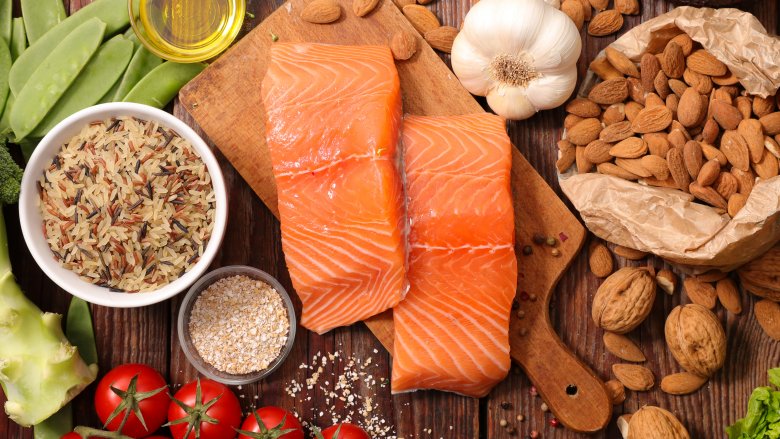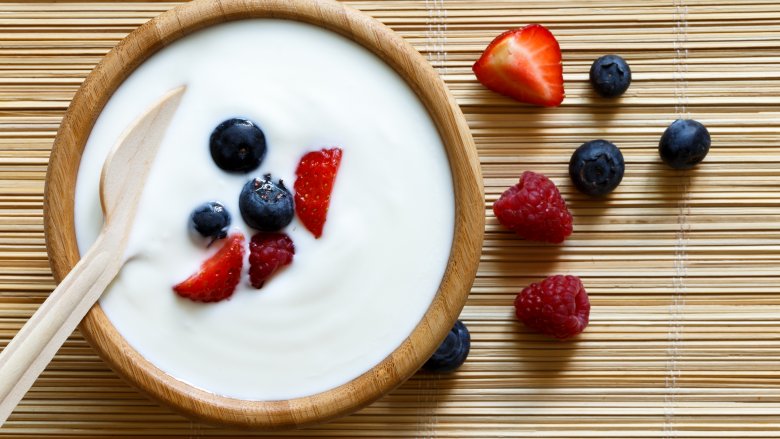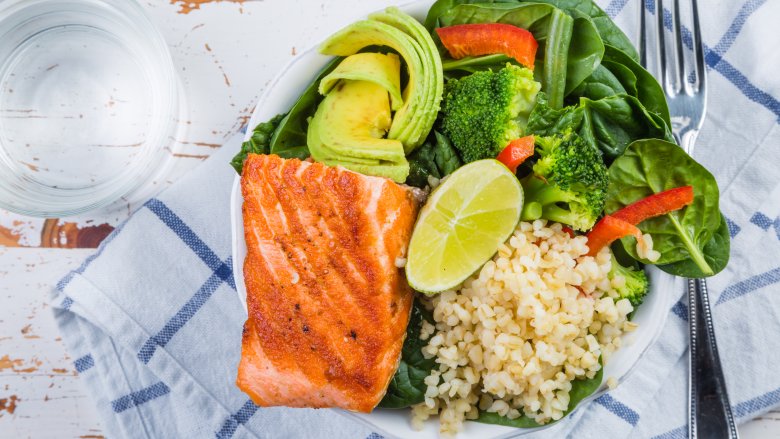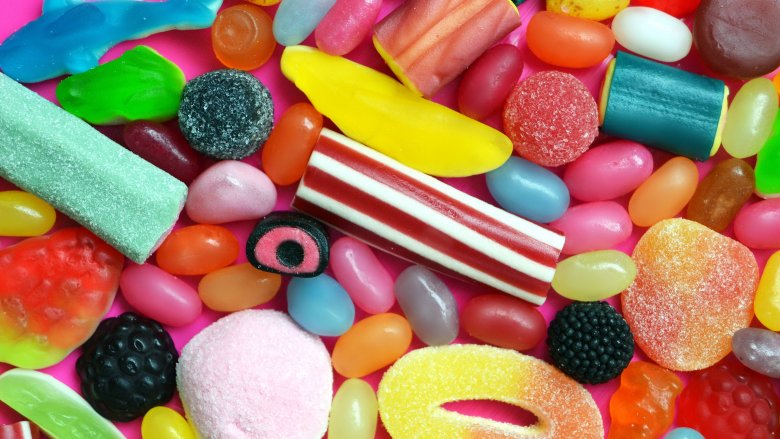Foods That Will Give You A Burst Of Energy
Is that mid-afternoon energy slump causing you to reach for that extra large coffee or hit the vending machine for a sugary boost? Are you struggling to stay alert at meetings or having trouble focusing at work? A lot of us are battling low energy levels because of poor sleep habits, day-to-day stress, and never-ending demands in our daily lives.
Although I can't get rid of the demands of daily life, as a registered dietitian, I can help you choose the right foods to stabilize and increase your energy levels, giving you the motivation to tackle anything. Adding just a few energy-boosting foods into your diet, while removing some energy zappers, can make an incredible difference in your day, your motivation, and your ability to stay awake during those long work meetings.
Eating for energy
Maintaining stable blood sugar is the key to keeping energy steady. The focus of any energy-boosting diet is to stabilize blood sugar, preventing too many highs, which are inevitably followed by lows. When blood glucose crashes, we tend to feel sluggish and tired. That is when we reach for the quick, sugary fix to bring our energy and blood sugar back up and the cycle begins again. Constantly chasing high and low blood sugar with sweets or caffeine leaves us exhausted.
If you want to get off the high-low roller coaster with your blood sugar, which will in turn stabilize your energy, there are very specific foods you should be eating everyday to help. The secret is eating enough protein at each meal, starting with breakfast. Protein takes longer to digest, helping slow the absorption of any carbohydrate eaten along with it. When protein is present, carbohydrates enter the blood slowly, preventing blood sugar from going too high or from crashing. The type of carbohydrate matters too — some are quickly absorbed and spike blood sugar, while others enter the blood slowly, ideal for sustained energy. So, in knowing this, which foods are ideal to help boost your energy throughout the day?
Eggs
Eggs have a bad reputation as an unhealthy food because of their high cholesterol content, but it is completely undeserved. Eggs, especially the yolk, are high in B-vitamins, which help with energy metabolism, or making energy from food. B-vitamins are also critical for making red blood cells, which help transport oxygen throughout the body — necessary for proper organ function.
Eggs also have a significant amount of protein, up to 8 grams per egg. They make an amazing breakfast to help maintain sustained energy. Starting your day with one or two eggs will provide you with enough protein to keep your blood sugar stable and energy high until lunch time.
Greek yogurt
Greek-style yogurt is another amazing breakfast option with just the right amount of protein. It contains significantly more protein than traditional yogurt, up to 15 grams per serving. The protein in the yogurt can help maintain blood sugar levels throughout the day, which is why it makes a great breakfast for those struggling with energy.
But there is one caveat with yogurt — it can contain a lot of sugar. If you are concerned about your energy levels, eating a high-sugar yogurt, even if it does have protein, will have the opposite effect you intend. Instead, make sure to choose plain yogurt with no added sugar or sweeteners. If plain yogurt is too sour for you, feel free to add some berries or your favorite fruit to sweeten it up.
Ideally, choose a yogurt that contains a little bit of fat, either made from 2% milk or whole milk. The fat in the yogurt will help decrease your appetite, as fat takes a long time to digest providing sustained energy, therefore you are not starving by lunch time.
Beans
Beans of all varieties are nutritional powerhouses. They contain a significant amount of protein and the right type of slow-digesting carbohydrates to help you maintain your energy throughout the day. Beans are also chock-full of vitamins and minerals used in energy metabolism, such as iron, magnesium, calcium, potassium, and B-vitamins.
The correct balance of protein and carbohydrates in beans allows them to be digested slowly, preventing blood sugar spikes and crashes. Iron in beans is critically important for healthy red blood cells, which carry oxygen for energy to all your body's tissues. Iron is also used in energy production. Minerals such as magnesium, calcium, and potassium are all important for energy metabolism. And lastly, the B-vitamins will help ensure that your food is efficiently used for more energy.
Whole grains
Whole grains are an excellent source of B-vitamins, fiber, and carbohydrates. Although carbohydrates can increase blood sugar, high quality, complex carbohydrates can provide sustained energy throughout the day. On the other hand simple, or refined carbohydrates, will cause your energy to spike and then crash just a few hours later.
Whole grains, such as quinoa, bulgur, and brown rice are digested slowly due to their complex structure. This allows for the sugar from these foods to be released slowly into the blood, leading to sustained long-term energy.
Almonds
Almonds are amazing for energy because they contain a bit of all three macronutrients: carbohydrates, protein, and fat. An ounce of almonds has 6g of protein, 6g of carbohydrates, and 14g of fat. Most of the fat is the heart-healthy monounsaturated fat. The balance of protein, carbohydrates, and fat helps maintain stable blood sugar and sustain long-term energy.
But, the benefits of almonds don't stop there. They also have B-vitamins, which, as we have discussed, are vital for energy metabolism. Just an ounce contains almost 20% of the daily needs for magnesium. A magnesium deficiency has shown to significantly lower endurance during exercise. Getting enough magnesium every day can ensure you have plenty of energy to get through that tough workout.
Fish
Although it may not be everyone's favorite food, fish has an incredible number of nutritional benefits, especially for maintaining stable energy levels. First, it is high in protein and high in omega-3 fats, touted for their amazing health benefits, especially for the brain. Omega-3s help the brain properly use glucose, or sugar, from food helping the brain function better. The better your brain is able to get access to the fuel it needs, the better it's going to work, and the better you will feel.
For the most benefit, choose wild-caught fish, which is higher in omega-3 content when compared to farm-raised fish. Also, focus on low-mercury varieties such as salmon, pole-caught tuna, and sardines.
The caffeine conundrum
The first thing many of us do when we are feeling sluggish is to reach for a little caffeine, either from a cup of coffee, an energy drink, or a soda. Caffeine does give us a temporary energy boost and may help us get moving in the morning. There is nothing wrong with a little bit of caffeine. Actually, a 2012 study found that regular coffee intake reduced the risk of death by a variety of causes including heart disease, respiratory failure, diabetes and infections. Tea also has some amazing health benefits.
So, what's the downside? Too much caffeine can backfire on you by causing anxiety and irritability. It can make your brain feel foggy and affect your performance. Caffeine is a stimulant and people tend to have different levels of tolerance to its effects. Too much coffee can also impact your sleep at night, leading you to feel exhausted the next day. It is totally fine to have a bit of caffeine to start your day, but be moderate, learn your individual tolerance and stick with it.
The importance of breakfast
Breakfast remains the most important meal of the day, especially for maintaining energy. A 2014 study found that people of a normal weight who ate breakfast experienced fewer fluctuations in blood sugar throughout the whole day into the evening hours. Breakfast stabilizes blood sugar, therefore stabilizes energy levels.
What should you eat for breakfast? Ideally, something with a bit of protein and a complex carbohydrate. A bit of Greek yogurt with some berries would be a great energy-boosting choice. Or an egg with a piece of whole grain toast. The combination of the energy-sustaining protein with the slow-burning complex carbohydrate will keep you productive until lunch.
Food combinations for energy
As I have mentioned, the secret to energy balance is to eat to keep your blood sugar stable. This is true, even for healthy people without diabetes. The key to keeping blood sugar stable is to eat protein, a bit of fat, and a complex carbohydrate at each meal and snack. This combination of nutrients is not just what our bodies need nutrition-wise, it is also what gives us the most sustained energy long-term.
Almonds are a quick way to get in the right balance of protein, fat, and carbohydrates in a quick and easily-transportable snack. A large salad with beans and and olive oil based dressing also gives you that perfect energy-boosting combo of complex carbs, protein, and fat. For dinner try some wild-caught salmon with a side of quinoa to achieve just that right balance. Learning a bit about food combinations and making sure each meal contains the right balance of nutrients will make a huge impact on your energy levels day to day.
Energy zappers
I have to mention foods that zap energy because avoiding these foods is just as important as eating the correct foods. First, anything high in refined sugar, i.e. cakes, donuts, cookies, pies, candy, regular soda, etc, is a primary culprit in the blood sugar rollercoaster. These foods don't need to be completely banned from your diet, but should only be eaten on special occasions.
Another common energy zapper is not eating enough calories. Women tend to be especially guilty of this, trying to get through the day on as little food as possible. Not only does this backfire in terms of slowing your metabolism and leading to weight gain, but not eating is also a recipe for energy crashes. Instead, listen to your body. If you are physically hungry, eat! Just choose a properly balanced snack or meal that will satisfy your hunger.
The bottom line
Fluctuating energy levels can have a lot of different causes. Although food can play a big role, it is not the only culprit for low energy. Also consider other factors like sleep quality, stress, and just your overall health. Even on days when you are not feeling your best, try to choose foods that will help boost your energy, rather than reaching for comforting favorites. Your body and your blood sugar will thank you.












